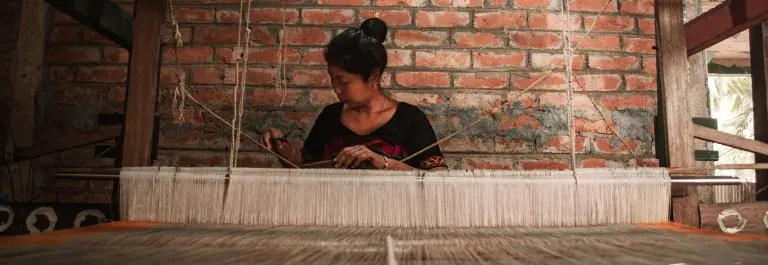Equity and empowerment
Equity is fundamental to sustainability, shaping human rights, livelihoods, and environmental efforts while strengthening resilience and impact. Addressing equity ensures fairness and inclusion, making sustainability systems more effective in tackling global challenges.
ISEAL has developed an Equity Framework through research and community engagement that serves as a foundation for understanding and advancing action on equitable outcomes in sustainability systems.
We are working to embed the framework in our work and in our conversations with our stakeholders where it provides a shared language and strengthens our ability to discuss the intersecting dimensions of inequity. We are also using it as an analytical tool to recognise and understand different empowerment approaches and to assess their impact, and to help develop programmes that overcome the various barriers that prevent inclusive growth and the transition to more equitable societies.
There has been little consensus on how the concept of equity is discussed with the ISEAL community and yet a recognised need to address inequity more intentionally within value chains. Having a common understanding and shared language helps integrate these considerations into the design and implementation of schemes and initiatives. It also ensures users develop actions that are purposefully directed towards creating fairer outcomes.
ISEAL is working with our members, businesses, NGOs, governments and through multistakeholder initiatives to engage different levers of change for more advance equitable outcomes. We raise awareness and work to develop greater understanding in order to drive action. We focus in particular on producers and workers who do not fully or fairly benefit from the gains of market-based systems.
To advance our work on producer equity, we have used the equity framework to inform a series of Producer Empowerment Case Studies, showcasing effective practices across various sectors. Each case study highlights approaches, strategies, and methodologies that contribute to improved equity and producer empowerment. These case studies are designed to support understanding of the power relationships in supply chains that have significant impacts on equity for labourers to producers. They aim to enable more informed discussion and help steer conversations to develop policies and programmes that have positive and equitable outcomes for producers and workers.
Recent developments in due diligence legislation are playing a pivotal role in addressing inequities within value chains by compelling companies to identify, assess, and mitigate adverse social impacts associated with their operations. Effective due diligence results in deeper understanding of potential social impacts. A cornerstone of effective due diligence is meaningful stakeholder engagement. This process involves ongoing two-way dialogue with affected parties, especially those who are often unrepresented and marginalized. Such engagement ensures that the voices of all stakeholders are heard, fostering collaborative identification and prioritization of issues, which is essential for implementing effective and inclusive solutions.
ISEAL works with our members to improve their capabilities and use of the Equity Framework to better embed more equitable approaches into their operations. In addition, this is also built into our code of conduct; ISEAL’s Code of Good Practice provides guidance on due diligence.
To enhance the capabilities of our members on data and measurement, ISEAL has launched the "Measurement & Equity" learning series, guiding sustainability systems monitoring and evaluation staff in integrating equity considerations into their evaluation systems. In line with ISEAL's Code sections 3.3 “Opportunities for stakeholder input” and section 6.6 “Balanced participation”, this work supports sustainability systems to track progress in their impact, identifying areas for action and driving targeted change for special interest groups within their systems.
ISEAL actively incorporates the principles of equity, good practice and emerging research into dialogues and events with our members and wider community through our involvement in various multistakeholder initiatives, including the Living Income Community of Practice (LICOP).
Read more about how Living Income Community of Practice is building pathways to living income through common tools and global exchange.
Working in partnership with the wider development and business communities, ISEAL is also building understanding and engagement of equity for small-scale producers in specific sectors, such as seafood. Achieving large scale and long-term change demands coordination and collaborative approaches between actors. Our approach is equally applicable to small scale production beyond seafood; in forestry and timer production, mining or renewable energy.
Learn from ISEAL’s case study on stakeholder engagement for producer inclusion:

